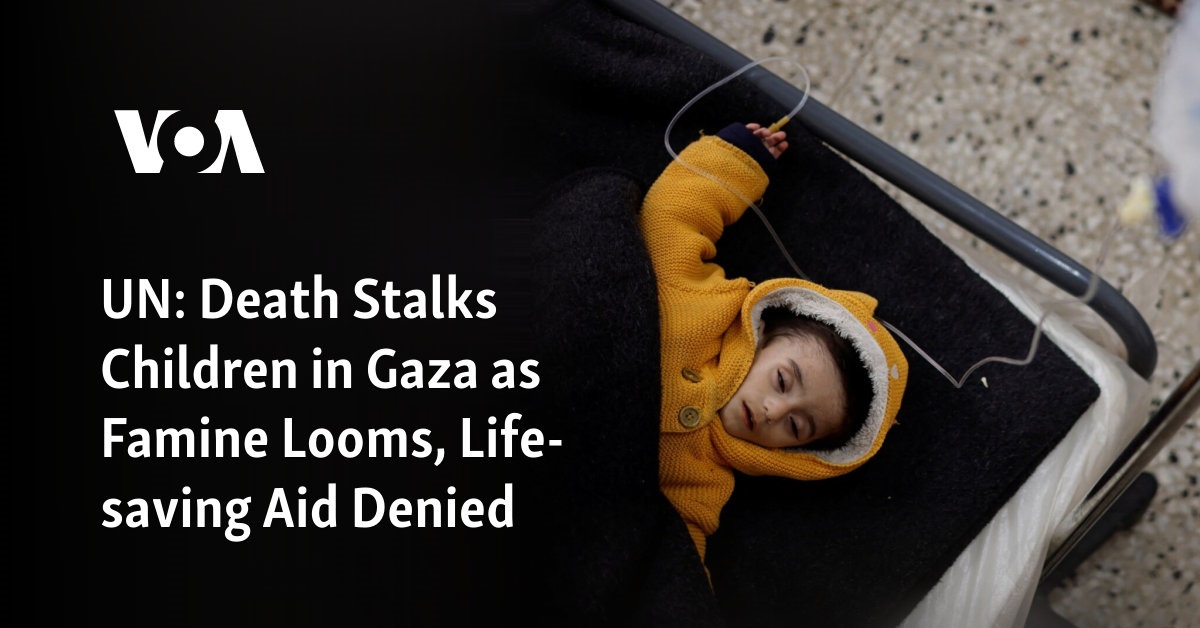A warning from U.N. aid agencies highlights the dire situation in Gaza, where more than a dozen children have succumbed to starvation, with many more facing the looming threat of malnutrition, escalating infectious diseases, and the severe blockade hindering crucial humanitarian assistance.
Dr. Rik Peeperkorn, the World Health Organization’s representative in the occupied Palestinian territories, raised concerns over the escalating crisis, emphasizing that 15 children have already perished due to malnutrition and dehydration at Kamal Adwan Hospital in northern Gaza. Additionally, six infants are currently battling acute malnutrition, underscoring the urgent need for intervention to avert further tragedies.
In a press briefing from Jerusalem to journalists in Geneva, Peeperkorn emphasized the urgent requirement for a sustained cease-fire to address the unfolding catastrophe affecting 2.2 million people in Gaza. The region is on the brink of famine, disease outbreaks, and a breakdown of social order, exacerbating the plight of internally displaced individuals grappling with severe shortages of essential resources.
A recent visit by a group of WHO officials to Al-Awda and Kamal Adwan hospitals in northern Gaza revealed the harrowing reality on the ground following the intense conflict between Hamas militants and Israel. Dr. Ahmed Dahir, the head of WHO’s Gaza sub-office, described the devastating conditions, highlighting the profound impact on both healthcare providers and patients struggling to cope with limited supplies and overwhelming trauma cases.
Despite the challenges, the delivery of critical supplies over the weekend managed to revive some essential services that had faltered, offering a glimmer of hope amid the prevailing crisis.
The team’s intervention at Al Shifa hospital, Gaza’s primary medical facility, provided vital support to children suffering from severe acute malnutrition. While this assistance was pivotal, Dr. Peeperkorn stressed that it only scratches the surface of the urgent humanitarian needs, emphasizing the imperative of sustained access to deliver life-saving aid to those in distress.
Jens Laerke, the spokesperson for the U.N.’s Office for the Coordination of Humanitarian Affairs, echoed the urgency of ramping up aid deliveries to address the escalating humanitarian crisis, particularly focusing on the imperative of preventing further child casualties due to starvation and inadequate medical care.
The plea for enhanced humanitarian access extends to urging Israel to open the Erez crossing point to facilitate the influx of essential goods into northern Gaza, which has been severely isolated from crucial aid supplies since November. The dwindling access to humanitarian relief poses a grave threat to the vulnerable population, necessitating immediate action to avert a deepening catastrophe.
UNICEF’s regional director for the Middle East and North Africa, Adele Khodr, issued a stark warning regarding the escalating child mortality rates attributed to dehydration and malnutrition in Gaza’s hospitals. The preventable nature of these tragic deaths underscores the urgency of ending the conflict and swiftly resolving obstacles impeding humanitarian assistance to save the lives of vulnerable children.
Recent malnutrition screenings conducted by UNICEF and the World Food Program underscore the alarming prevalence of acute malnutrition among children in Gaza, with rates significantly higher in the north compared to areas with relatively better access to aid. The dire situation underscores the critical need for sustained humanitarian support to mitigate the escalating health crisis and prevent further loss of innocent lives.




